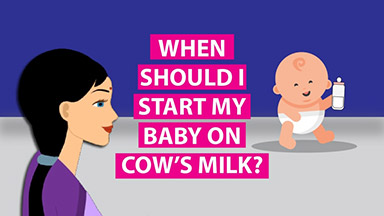Many infants have problems with cow’s milk. Babies who are exposed to cow’s milk before their first birthday are more likely to be anaemic, have diarrhoea or vomiting, and/or experience an allergic reaction. The protein content of the cow’s milk is way higher and may not be able to be digested by the immature and developing kidneys of the baby. The excessive protein load in cow’s milk can thus overload a baby’s kidneys. Cow’s milk is also deficient in vitamins C, E, and copper. It is also very low in iron and the calcium in the milk inhibits the absorption of iron. It is harder to digest as well, and can sometimes cause intestinal blood loss in the babies leading to anaemia.
Supplemental milk of any kind is not necessary if the baby is allowed to nurse frequently until the age of one. Once the baby is past one year old, whole cow's milk may be given, provided the baby has a balanced diet of solid foods (cereals, vegetables, fruits). But limit intake of milk to no more than 1 to 1 and a half glass a day. More than this can provide too many calories and may decrease the baby’s appetite for the other foods that he/she needs. If your baby is not yet eating a broad range of solid foods, talk to your paediatrician about the best nutrition for him or her.
A toddler needs higher fat content in his diet, which is why whole vitamin D milk is recommended for most infants after one year of age. But, always give baby’s pasteurized milk. One glass of cow’s milk gets the child ( 1 to 3 year old) nearly 40 percent of the recommended amount of calcium and 20 percent of the recommended amount of vitamin D. Milk also carries a high amount of protein which helps your baby grow. It also contains carbohydrates which give your child the energy that they need throughout the day. A child with abundant levels of calcium will have stronger bones, a healthy blood pressure, and a healthy heart.
So - Wait till the baby turns one to introduce cow’s milk. Start slowly, A one-year-old can be offered about 1 cup a day to begin and eventually to 1 and a half cups a day. Monitor your child during the first few days after the introduction of any new food for any signs of insensitivity. Look for symptoms like diarrhoea, flatulence, irritation, vomiting and noisy bowels. Consult your paediatrician if you see any of these signs in your baby.

